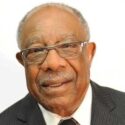 In November, Ronald L Jackson II, dean of the College of Arts & Sciences at the University of Cincinnati, resigned his position after only 16 months on the job. University emails revealed that Jackson was told to resign or he would be terminated. He had been the first African American dean at the university. Two months prior to his resignation, a crude cartoon portraying Dean Jackson in a stereotypically racist manner was circulated on campus.
In November, Ronald L Jackson II, dean of the College of Arts & Sciences at the University of Cincinnati, resigned his position after only 16 months on the job. University emails revealed that Jackson was told to resign or he would be terminated. He had been the first African American dean at the university. Two months prior to his resignation, a crude cartoon portraying Dean Jackson in a stereotypically racist manner was circulated on campus.
Before his appointment as dean in 2012, Dr. Jackson was professor of media and cinema studies and African American studies at the University of Illinois at Urbana-Champaign. He holds bachelor’s and master’s degrees from the University of Cincinnati and a Ph.D. in communication from Howard University in Washington, D.C. He remains on the faculty at the University of Cincinnati.
Protests occurred on campus on the day following Dr. Jackson’s resignation as dean calling for the university to take additional steps to increase faculty and student diversity and to boost retention and graduate rates for Black students.
The university has responded with a one-time infusion of $200,000 for the Turner Scholarship program and annual increases totalling $400,000 for three scholarship programs. One program benefits minority and low-income students from Ohio. Another program provides funds for women or minorities in STEM fields and the third program is for minority students in graduate programs.
The university also announced a $350,000 renovation for the African American Cultural & Resource Center, the hiring of an assistant director for multicultural recruitment, and $280,000 to develop or enhance diversity initiatives on campus.
African Americans make up 7.5 percent of the students at the University of Cincinnati.












Article contains some misinformation about the first black Dean at the University. Lonnie Wagstaff once served as Dean of the College of education.
You are correct. I helped to recruit Lonnie to the University of Texas over 20 years ago, there was also a Dean of the General College around that time who went on to become the President of the Wayne County Community College in Detroit Michigan (Ronald Temple).
Charles A.Green PhD
The increased funding does not address the issue of non-white faculty and deans and the racially hostile environment on that campus.
These are really first-order changes which won’t result in any real changes. It is somewhat insulting that Univ of Cincinnati thinks that throwing money at this is the solution. How about the institution put together a campus climate committee with key stakeholders, including students and ask for recommendations on how to improve the climate on campus for students AND faculty of color?